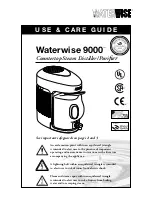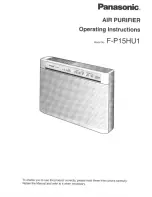
5167821-YTG-J-0518
Johnson Controls Ducted Systems
29
Altitude and Temperature Correction for CFM, Static Pressure
and Power.
The information below should be used to assist in application of
product when being applied at altitudes at or exceeding 1000 feet
above sea level.
The air flow rates listed in the standard blower performance tables
are based on standard air at sea level. As the altitude or
temperature increases, the density of air decreases. In order to use
the indoor blower tables for high altitude applications, certain
corrections are necessary.
A centrifugal fan is a "constant volume" device. This means that, if
the rpm remains constant, the CFM delivered is the same
regardless of the density of the air. However, since the air at high
altitude is less dense, less static pressure will be generated and
less power will be required than a similar application at sea level.
Air density correction factors are shown in
Altitude/Temperature
Correction Factors Table
and the following figure.
The examples below will assist in determining the airflow
performance of the product at altitude.
Example 1:
What are the corrected CFM, static pressure, and
BHP at an elevation of 5,000 ft. if the blower performance data is
1,400 CFM, 0.6 IWC and 0.67 BHP?
Solution:
At an elevation of 5,000 ft. the indoor blower will still
deliver 1,400 CFM if the rpm is unchanged. However, the
Airflow
Performance Table
must be used to determine the static pressure
and BHP. Since no temperature data is given, we will assume an air
temperature of 70°F.
Altitude/Temperature Correction Factors
Table
shows the correction factor to be 0.832.
Corrected static pressure = 0.6 x 0.832 = 0.499 IWC
Corrected BHP = 0.67 x 0.832 = 0.56
Example 2:
A system, located at 5,000 feet of elevation, is to
deliver 1400 CFM CFM at a static pressure of 1.5". Use the unit
blower tables to select the blower speed and the BHP requirement.
Solution:
As in the example above, no temperature information is
given so 70°F is assumed.
The 1.5" static pressure given is at an elevation of 5,000 ft. The first
step is to convert this static pressure to equivalent sea level
conditions.
Sea level static pressure = 0.6 / .832 = 0.72"
Enter the blower table at 1400 CFM and static pressure of 0.72".
The rpm listed will be the same rpm needed at 5,000 ft.
Suppose that the corresponding BHP listed in the table is 0.7. This
value must be corrected for elevation.
BHP at 5,000 ft. = 0.7 x .832 = 0.58
Altitude/Temperature Correction Factors
Air
Temp.
Altitude (Ft.)
0
1000
2000
3000
4000
5000
6000
7000
8000
9000
10000
40
1.060
1.022
0.986
0.950
0.916
0.882
0.849
0.818
0.788
0.758
0.729
50
1.039
1.002
0.966
0.931
0.898
0.864
0.832
0.802
0.772
0.743
0.715
60
1.019
0.982
0.948
0.913
0.880
0.848
0.816
0.787
0.757
0.729
0.701
70
1.000
0.964
0.930
0.896
0.864
0.832
0.801
0.772
0.743
0.715
0.688
80
0.982
0.947
0.913
0.880
0.848
0.817
0.787
0.758
0.730
0.702
0.676
90
0.964
0.929
0.897
0.864
0.833
0.802
0.772
0.744
0.716
0.689
0.663
100
0.946
0.912
0.880
0.848
0.817
0.787
0.758
0.730
0.703
0.676
0.651
0.600
0.650
0.700
0.750
0.800
0.850
0.900
0.950
1.000
1.050
1.100
40
50
60
70
80
90
100
Air Temperature (ºF)
Correction Factor
Sea Level
1000 ft
2000 ft
3000 ft
4000 ft
6000 ft
7000 ft
8000 ft
9000 ft
10000 ft
5000 ft















































